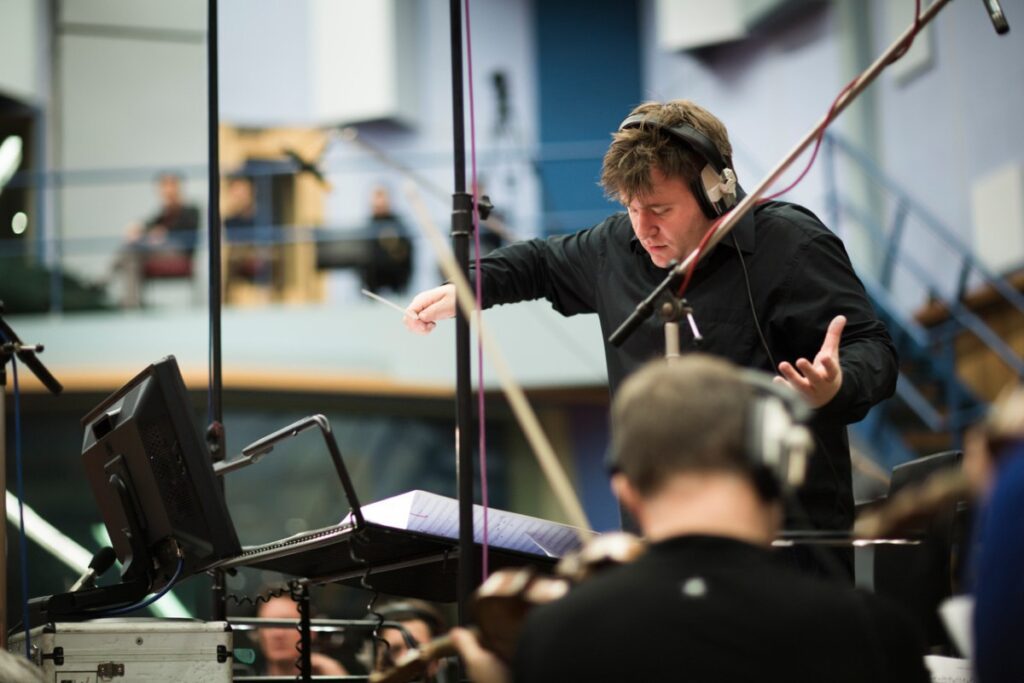Editor's Note: This story was co-authored with Hannah O.
Mortal Kombat, due out on April 23rd, is the latest addition to the iconic Mortal Kombat game franchise. Directed by Simon McQuoid, the new film is a remake of the classic 1990s Mortal Kombat film series based off of the fabled American action video game.
Since the game’s original release in 1992, the iconic series has become easily recognizable by its kinetic theme song, “Techno Syndrome” by The Immortals. It was essential that the 2021 movie had a soundtrack that modernized the film while also honoring the franchise and its beloved theme song.
Prolific composer Benjamin Wallfisch, known for scoring massive films such as It, Bladerunner, and Hellboy, took on the project in hopes of reinventing the soundtrack while also preserving the legacy of Mortal Kombat.
“The first question I had to ask myself is how can we reinvent ‘Techno Syndrome’ in a way that isn’t cheesy and obvious,” Wallfisch tells EDM.com. “I made an experiment for myself before I even met the director for the first time just to see where I could take that track in terms of its absolute core material and reinventing it as an orchestral piece.”
Wallfisch grew up playing the arcade game, and recognized the prominence of the project and the responsibility to protect and enrich its history. Before he could commit to such a great endeavor, he had to experiment with “Techno Syndrome” and see if it was possible to translate it into an orchestral composition. He started with three or four notes of the melody and some of the riffs from the original track, and found creative ways to play with the tempo and harmonies until he decided he could do the song justice.
“It was just a great opportunity to embrace the fanbase of something that’s so iconic," Wallfisch said. "There’s definitely a lot of responsibility that comes with that.
Although Wallfisch was excited to reinvent the classic theme song, he was also heavily focused on preserving its legacy. In order to maintain the nostalgia that fans associate with the series, he kept these core themes at the forefront of his compositions. “It’s about thinking quite carefully what it is that the fans love, the core things,” says Wallfisch. “It's the characters, the intensity of the fights, the law, the legend, and the backstory.”
While Wallfisch has a great appreciation for the nostalgia of the series, he was also intent on distinguishing the movie as its own contemporary piece. “We didn’t let anything through unless it felt fresh," he explained, describing the quality of production he and McQuoid aimed for.
“I’m really proud of the work we did on Mortal Kombat," he continued. "We were pretty bold in some of the decisions, and pretty avant-garde too, especially in the action scenes."
Wallfisch strived to replicate the energy and intensity of the action scenes in the score, using different tones and experimental techniques to distinguish fights between the franchise's storied characters. “It was definitely one of the most challenging things I’ve ever done,” he asserted.

Warner Bros. Pictures and New Line Cinema will release Mortal Kombat in the United States on April 23rd, 2021.
c/o Warner Bros.
Throughout the project, Wallfisch limited his listening to only the earliest music from the franchise. “When 'Techno Syndrome' came out in the early 90s, it brought techno music to the mainstream," he explained. “I wanted to make it a celebration of electronic music and this iconic track.”
Even to this day, Wallfisch continues to find himself amazed by innovation and experimentation happening in the EDM community. He is particularly fascinated with its artists and their ability to "bend the laws of physics and acoustics."
While many genres of music base their songs off of repetitive verse and choruses, Wallfisch finds the tension and release structure found in EDM to be very refreshing. He even went as far to say that the format, which is comparable to the structures used in film scoring—especially psychological thrillers and horror—have deeply influenced his work, including that of Mortal Kombat.
“I was incredibly lucky on this track that I got to work with Tom Norris, who’s an extraordinary mixing and mastering engineer," Wallfisch said. Norris, an award-winning producer, songwriter, and audio engineer known for his work with artists such as Lady Gaga, Skrillex, and Zedd, was brought on to the Mortal Kombat team to engineer the score.
"[Norris] brought such unbelievable power and energy to the track, and it was such a great honor to work with him," Wallfisch exulted.

Wallfisch collaborated with Tom Norris to reinvent the iconic theme song of Mortal Kombat, calling the record producer "an extraordinary mixing and mastering engineer."
Having worked on dozens of other soundtracks, Wallfisch has become accustomed to working with large orchestras to record his scores. However, shortly after committing to the project, the COVID-19 pandemic struck and completely turned the world of film scoring upside down. Without access to large orchestras, Wallfisch was forced to completely overhaul the recording process for the Mortal Kombat soundtrack.
"The biggest difference was how we recorded it because the score is written on a very large scale for a symphonic sound. We would usually use an 100-piece orchestra for something like that and a very large choir,” said Wallfisch. “We recorded it in Sydney and because of the COVID restrictions we could only have 35-40 musicians in the room at one time, so we had to construct the score in very small chunks and layer it up.”
Without the live recording experience, it became more difficult for Wallfisch and the musicians to capture the energy and coordination of playing in a room together with everyone. This new challenge forced him to work with his musicians for over a year to complete the score. For comparison, Wallfisch’s score of The Invisible Man took only six weeks to finalize.
Despite the hurdles, Wallfisch is grateful for the experience and is glad to know that it is possible to record that way. However, he would never choose to record like in such a manner again and is excited to return to full orchestra recordings after the pandemic.
“Building this score was a very different process, but we got there in the end,” Wallfisch said. “All the credit goes to the incredible musicians who persevered through it and helped bring to life an incredible score.”



